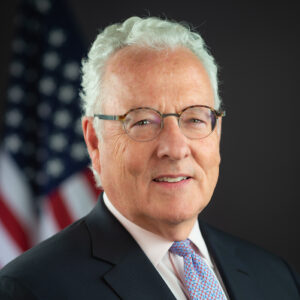In February, I filed a motion to intervene in SEC v. Ripple Labs, the first big crypto enforcement action filed in December 2020 by the Securities and Exchange Commission (SEC). I have written two dozen stories about the serious implications of the case, particularly on the sweeping regulatory overreach at the heart of the SEC’s arguments and the naked power grab it represents. The agency spent most of the last two years fighting Ripple’s attempts to obtain internal SEC emails and documents on the drafting of a 2018 speech given by then-Director of Corporation Finance William Hinman, where he introduced a long list of “what we look at” when determining whether a digital asset is a security.
Those documents were important to Ripple’s defense, as it was accused by the SEC of unregistered securities trades by selling the digital asset XRP. Hinman had laid out a regulatory vision of token sales not being securities under criteria that arguably fit XRP. Ripple’s two senior executives, Chris Larsen and Brad Garlinghouse, were also accused of reckless disregard for securities law because, the SEC alleged, they should have known that XRP was a security back in 2013 when those distributions began.
The SEC’s fight to conceal them was so absurd that Magistrate Judge Sarah Netburn slammed the agency for its “hypocrisy” in “adopting its litigation positions to further its desired goal, and not out of a faithful allegiance to the law.”
The documents were finally handed over to Ripple under seal last November, but my motion was a plea to Judge Analisa Torres of the Southern District of New York to unseal them for the public. Hinman’s speech was touted as guidance to crypto companies on how token sales would be regulated, but the Ripple lawsuit was the first of many that flew in the face of that guidance.
The Hinman documents were finally made public, and having seen them, it is no surprise the agency fought to hide them. They unmask the SEC, showing an agency more concerned about its own jurisdictional turf than protecting investors. They also show a high-ranking official ignoring explicit internal warnings that he was not following the law.
Indeed, the unsealed documents will only fuel the long-standing ethical cloud over Hinman, who made headlines by declaring in that speech that Ethereum’s native token Ether is not a security, while he was also receiving millions of dollars from a law firm that was promoting Ethereum. Not only do the documents prove Hinman made the Ether declaration against the express wishes of the SEC Office of General Counsel (OGC), but he consulted Vitalik Buterin – a leading third-party promoter of Ethereum – as he was preparing to do it.
The emails show that giving Ethereum a free pass was why Hinman initially wanted to give the speech. Never budging from that goal, he blew past OGC’s objections to his backfilling some legal justification for it. The drafts contain repeated warnings that his legal theory about a network “becoming sufficiently decentralized” was something Hinman was making up out of thin air. Both OGC and the Office of Trading and Markets complained several times that he’d be confusing the markets “even more” than they already were confused. But Hinman was a man on a mission to de-risk Ethereum regardless of the consequences for others.
In the emails, then-SEC Chairman Jay Clayton was conspicuously copied, but the SEC Ethics office was not. There is nothing in the emails to indicate that Hinman’s potential conflict of interest with his former law firm was ever discussed, nor that Clayton intervened despite staff worries over confusing the markets and Hinman going off the legal rails.
But the OGC was definitely worried about the SEC’s power. They chided Hinman for “pointing out” in the speech that there is a “regulatory gap that exists in this space” with digital assets falling into an “other” category not covered by the 1946 Howey decision that defined securities and, therefore, not under the SEC’s regulatory purview. It’s a remarkable admission, especially in the context that they were imploring Hinman not to say it in public.
So many new and confounding questions arise from these documents, and it is no longer justifiable for the SEC to keep stonewalling and deceiving the public about the so-called “clarity” of the rules. Here we see them fighting with each other over what the law says, deliberately confusing the markets while claiming “the rules are clear,” and then vindictively suing companies like Ripple, LBRY, Coinbase, and others that try to comply.
Using common sense, from a lay perspective, these documents also exonerate Larsen and Garlinghouse from the charge of reckless disregard for rules that Hinman and the SEC staff couldn’t agree on. It is ridiculous to allege the executives carry retroactive personal liability going back to 2013 when these internal disagreements were so intense in 2018, and Hinman’s speech is still sitting on the SEC’s website.
It is time to pull back the curtain and shine a bright light on why Hinman was allowed to give that speech at all and why Clayton touted it as guidance to the markets. The documents that Ripple stumbled over are certainly not everything that will illuminate the public on how its government is botching this important issue. If the SEC won’t hand more documents over to watchdog groups like Empower Oversight, then Congress needs to investigate the Hinman speech and its aftermath with subpoenas and hearings.
It is also clear that the SEC Inspector General needs to investigate why the Ethics office was either not consulted on Hinman’s speech or kept out of the process. Given what Empower Oversight has already uncovered about Hinman’s repeated violations of ethics rules while he served at the SEC, the questions of why he gave that speech, why he ignored the OGC’s legal warnings, and why he was so determined to give Ethereum a free pass must be answered if the SEC expects to have any credibility.
Disclosure: The author owns no cryptocurrency and has no financial interest in the SEC v. Ripple case. She has no relationship, financial or otherwise, with any parties in the article. She receives no compensation to study this topic but pursues it as part of her research on regulatory policy.


